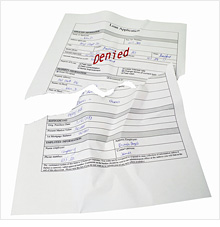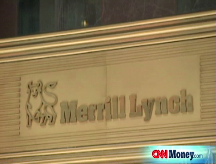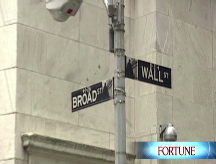Credit crunch hits small businesses
If the inability to land a bank loan is preventing you from expanding, you're not alone.

(CNNMoney.com) -- Stephani Smith's Maui-based healthy meals delivery company had been thriving since 2004, but needed financial assistance to expand its marketing efforts and Web exposure.
"I was the type of business that in times like this people have to cut out," she explains. "More and more people had to let go of the convenience we offered to save money and instead make their own dinners, pack their own kid's lunches, do their own grocery shopping and eat less organically."
Smith approached Leili McKinley of Haiku, Hawaii, business consultancy Soaring Phoenix in February 2007 to get advice on procuring a bank loan that she believed would help her boost business in a tough economy. With a good credit score and a business partner who had connections with a corporate officer at American Savings Bank, Smith would be a shoo-in for a loan, McKinley thought. So Smith reached out to ASB and Central Pacific Bank (CPF) for help.
"But the banks stalled on her," McKinley said. "Every time we called, it was something different - lost paperwork or required documents that had never been asked for. It seemed that their tactic was to see for how long she could survive without the loan before considering her."
She couldn't. After months of holding on, Smith folded her business.
Around 65% of domestic banks say they have tightened their lending standards for commercial and industrial loans to small firms over the past three months, according to the July 2008 Senior Loan Officer Opinion Survey on Bank Lending Practices, released in August from the Federal Reserve System. That's up sharply from the 50% of banks reporting tighter credit in the April edition of the quarterly survey.
The National Federation of Independent Businesses' most recent Small Business Economic Trends report sings a different tune, saying that that the credit crunch is a Wall Street-only issue. Thirty-four percent of the survey's August respondents, a selection of NFIB members, reported regular borrowing activity. That's in line with historical trends, although 10% said loans are getting harder to land. Only 2% of the owners polled cited the cost and availability of credit as their number-one business problem, far from the record 37% in 1982.
Bill Dunkelberg, chief economist for the NFIB criticized the Bank Lending Practices report's findings, noting that the 52 banks surveyed represent the largest banks in the nation. As chairman of Liberty Bell Bank, a small bank in southern New Jersey, Dunkelberg believes that smaller banks, which cater more to small businesses than to large ones, are doing just fine.
"As a small bank, we're not borrowing deposits to lend out or any of that fancy schmancy stuff," he said. "We have the savings accounts of the little people and we're lending out to them."
But Maria Coyne, executive vice president of community banking for KeyBank (KEY, Fortune 500), a nationwide midsized lending institution, sees banks everywhere clamping down. Even smaller banks that avoided the risky gambles that have decimated Wall Street are hit by the ripple effects of major crashes like Bear Sterns and Lehman Brothers (LEH, Fortune 500).
"Most banks are safe and sound, but these unprecedented times are affecting everything that has to do with banking," she said. "Stock prices have depressed, capital costs have increased, and regulators are more focused on capital adequacy ratios -- even for banks that didn't do sub prime mortgage lending." Banks still want new clients, but Coyne sees them being ultra-cautious.
Credit availability is a mixed story right now, according to Ray Keating, chief economist for the Small Business and Entrepreneurship Council, a small-business advocacy group in Oakton, Va.
"If you are dealing with a bank that isn't in trouble and you have a good track record and relationship with that bank, you'll have less of a problem getting a loan," he said. "But it's only expected that they will want more information to prove to regulators and investors that the loan is worth it. That means that it's a heck of lot tougher for startups and small businesses without track records to get loans."
Entrepreneur Delphine Humphrey, founder of the Mikado Kids Drop Inn childcare center in Arlington, Texas, found financial institutions reluctant to loan her start-up capital despite her great personal credit and a strong business plan developed with the help of experts at her local small-business development center.
"I cried myself to sleep several times," she said, recalling the past year. "We tried four banks and after getting rejected from all four, we decided to get creative." After three months of searching, Humphrey secured a loan from microloan organization Accion Texas. She will open the doors of her daycare for the first time this week.
Tulsa-based business coach Bill Bartmann says it's clear that banks are treating people differently. "They've changed their standards," he said. "They want to see what value you can bring to the bank."
Michele Larson, also a client of McKinley's on Maui, wanted to expand her one-year-old fitness center to another island. She, unlike Smith, procured a loan, but had to jump through hoops with three banks just to get a proposal.
"She was sitting on heaps of cash and had a perfect credit score," McKinley said. "Three years ago, the banks would have come back to her within 30 days. But instead they grilled her on balance sheets, business plan and personal finances for months."
Six months after the time she applied, the bank came back with outrageous terms on the loan. "The conditions were terrible. Basically, the bank wanted to control all my money," Larson said. "Also, there were no fixed rates and at the end of the fiscal year, I had to pay an additional 25% of excess cash flow back to the bank. Thank goodness for my accountant, who helped translate all the jargon and caution me."
Business coach Bartmann, as well as KeyBank's Coyne, emphasize that an entrepreneur's relationship with their bank can make or break a loan today. "It can differentiate you from all the other small business owners who walk into the same bank vying for the same money," he said.
And yet the NFIB remains adamant: "Credit has tightened ever so slightly since 2003," Dunkelberg said. "But there's no seizing up of markets - nothing is frozen on Main Street."
Over on Maui's main street, the view is grimmer. "I'm really shocked that large organizations whose constituents are small businesses are saying that the credit crunch is only affecting Wall Street," McKinley said. "It just seems really off target." ![]()
iReport: How's your business faring? How are the economic pressures affecting your business? Are you making fewer sales? Doing less advertising? Working longer hours? Or, has your firm found a way to thrive in the current environment? Send your photos and videos, and they could be profiled in an upcoming CNNMoney.com story.
Pick one: Your business or your house: When cash flow gets tight, small business owners pay their business bills first, mortgages second, a new study finds.
Poll: Small-biz owners down on economy, working longer hours
Raising cash for a fast-growing business
-
The Cheesecake Factory created smaller portions to survive the downturn. Play
-
A breeder of award-winning marijuana seeds is following the money and heading to the U.S. More
-
Most small businesses die within five years, but Amish businesses have a survival rate north of 90%. More
-
The 10 most popular franchise brands over the past decade -- and their failure rates. More
-
These firms are the last left in America making iconic products now in their twilight. More











